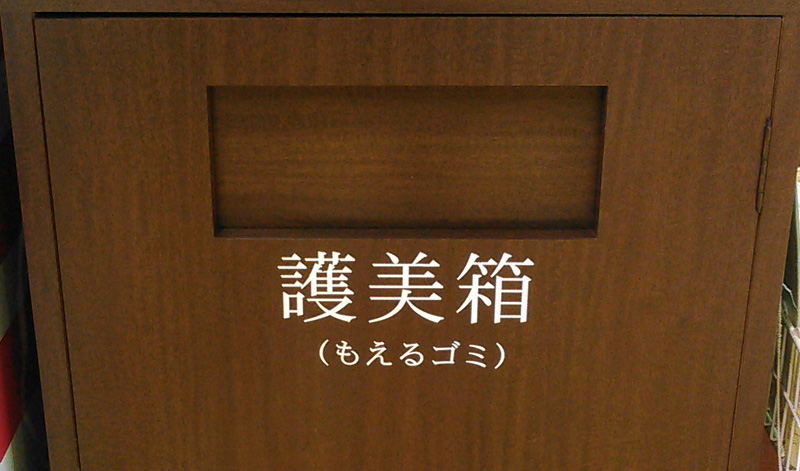Beauty-protecting box
« previous post | next post »
Nathan Hopson sent in this photograph of a trash can / rubbish bin in Nagoya, Japan:
We've discussed the orthographical form of Japanese "gomi" ("trash; rubbish; garbage") in the comments here: "Do not dumb here" (12/8/14). The words in the top line are pronounced gomi bako ごみばこ ("rubbish box"). So far, so good.
In our previous discussion on gomi, we talked about the common orthographical preference for katakana ゴミ over hiragana ごみ. The photo above shows another possible choice for writing gomi bako ごみばこ ("rubbish box"), all in kanji: 護美箱, pronounced the same but with the underlying meaning of "beauty-protecting box." Obviously, the beauty here is environmental rather than personal.
Nathan remarks:
This is not common (and feels a bit forced and hackneyed to me, at least), but I have seen it on more than one occasion.
The second line reads:
moeru gomi もえるゴミ
("combustible rubbish; burnable trash")
with the first word in hiragana and the second word in katakana.
Just from looking at this example, we see that it is possible to write Japanese words in a variety of ways:
gomi: ごみ, ゴミ, 護美
moeru: もえる, 燃える, モエる
bako: バコ, ばこ, 箱 — cf. bokkusu ボックス
Once again, this would seem to demonstrate the priority of sound over graphic form.

krogerfoot said,
September 27, 2015 @ 5:18 pm
"Just from looking at this example, we see that it is possible to write Japanese words in a variety of ways: gomi: ごみ, ゴミ, 護美"
Isn't 護美 meant here to be wordplay? I've never seen it before, and it doesn't come up in any dictionary I have nearby. Wikipedia gives 芥、塵、埖 for ゴミ.
Matt said,
September 27, 2015 @ 6:41 pm
It's wordplay, but it does convey the meaning and it isn't a portmanteau word or anything, so technically it is a way to write "gomi". I guess the question is, do we consider it any more "valid" a way to write the word than, say, "E-Z" for "easy" in English?
(It's also interesting to consider that this way of writing "gomi" is only really permissible when it's followed by "-bako" or similar. "Please be sure to use the beauty-protecting box" makes sense; "I hate people who don't clean up their beauty protection when they leave a campsite" doesn't.)
krogerfoot said,
September 27, 2015 @ 7:16 pm
It's certainly valid, but the reaction I'm getting from native J-speakers is mostly puzzlement, then an eye-roll at the photo.
I only meant I took the OP's sentence to mean "護美" was a way one might encounter the Japanese word gomi ("trash"), which surprised me. It seems like this example is more of a one-off than a variant or colloquialism like EZ or B4.
I definitely agree that the context of the trash can is needed to make 護美 understandable as (not-terribly-sparkling) wordplay. It seems more like a nonce word otherwise.
Victor Mair said,
September 27, 2015 @ 8:36 pm
@krogerfoot
In the OP, Nathan Hopson says that he has seen it more than once.
It occurs thousands of times on the internet, including here:
http://ejje.weblio.jp/content/%E8%AD%B7%E7%BE%8E%E7%AE%B1
Matt said,
September 27, 2015 @ 11:29 pm
It's hard to draw a principled distinction between this and, say, 倶楽部, the fanciful but quite common kanji spelling for kurabu (< English club) which implies the meaning "group that has fun together".
krogerfoot said,
September 28, 2015 @ 2:00 am
I think the operative phrase from Nathan Hopson's description was "forced and hackneyed." As Matt says, only with 箱 to clarify does the wordplay come through. Every J-speaker I've shown the ごみ、ゴミ、護美 string to has reacted with bafflement, followed by a groan when they see the context. It's closer to "geaux" as in "Geaux LSU Tigers" than 倶楽部, I think.
Victor Mair said,
September 28, 2015 @ 7:00 am
I learned that the Mandarin word for "club" was jùlèbù 俱乐部 about forty-five years ago and always thought that was a cute translation, though I also wondered about the phonology, which doesn't fit very well. So I always assumed that it had come through one of the topolects where the phonology fit slightly better, e.g., Cantonese keoi1lok6bou6. Now I see that it sounds much better as a transcription of the English word in Japanese than in Chinese, but I still have a small problem: how does the transcription come out as kurabu when the only on (Sino-Japanese) readings I know of for 楽 are:
1) Gaku (Music)
2) Raku (Enjoyable)
3) Gou (Like, be fond of)
4) Rau (Cure, Heal)
Nathan Hopson said,
September 28, 2015 @ 7:18 am
In 倶楽部, the first syllable of らく (raku) is being used.
This kind of creative truncation is not unusual for these playful, fanciful, informative coinages.
A similar logic is sometimes seen in proper names, where a kanji is read only partially. It's a different phenomenon from reading 星 (ほし hoshi) as "Sutā" to name your boy (after David Bowie?).
Matt said,
September 29, 2015 @ 7:49 pm
楽 as just "ra" actually has an older pedigree too – in early Japanese documents, the name of the capital Nara is often written with a final 楽. Some argue that this is because the name itself derives from something like *narak (some discussion of this at Wikipedia), but the pronunciation from at least Old Japanese on seems pretty clearly to have been just /nara/.
That is, the 楽 may initially have been chosen to match a final /k/ sound in some ancestor of the word /nara/, but where 寧楽 (for example) appears in the Man'yoshu, there's no evidence that any pronunciation other than /nara/ is intended, so for all intents and purposes one of the pronunciations of 楽 was just /ra/.